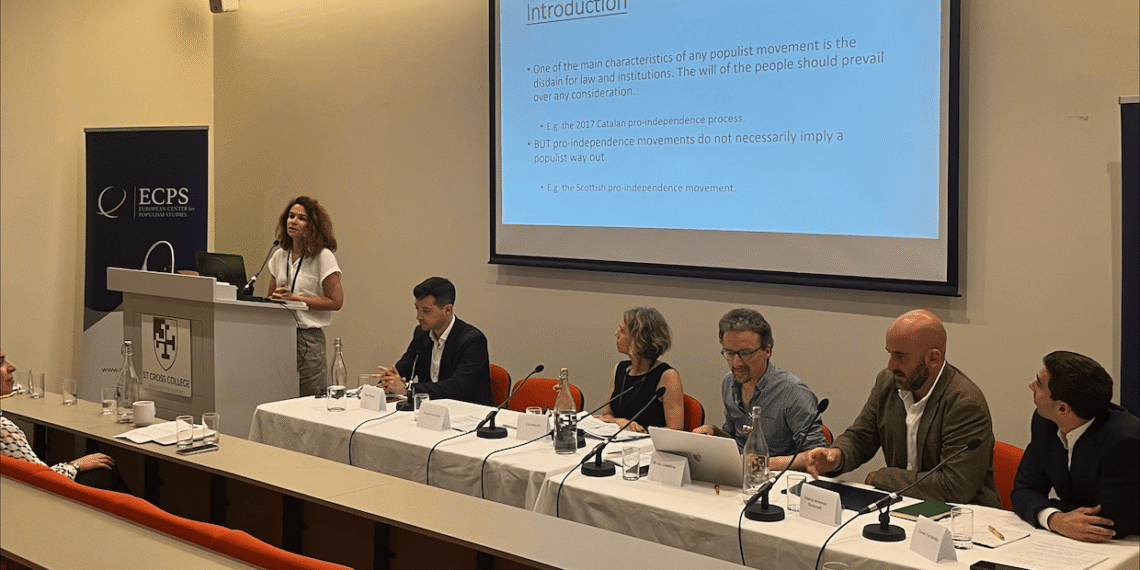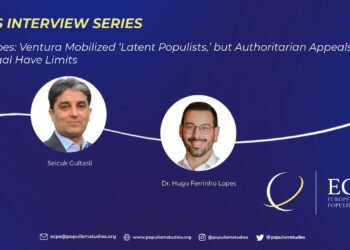Please cite as:
ECPS Staff. (2025). “ECPS Conference 2025 / Panel 3 — Populist Threats to Modern Constitutional Democracies and Potential Solutions.” European Center for Populism Studies (ECPS). July 8, 2025. https://doi.org/10.55271/rp00105
Panel III of the ECPS Conference 2025, held at the University of Oxford, gathered five scholars from the Jean Monnet Chair in European Constitutional Democracy (EUCODEM) at the University of Barcelona to explore how populist forces are challenging liberal-democratic norms—and what institutional remedies might resist them. Chaired by Dr. Bruno Godefroy, the session addressed threats to judicial independence, the populist appropriation of secessionist demands, and the theoretical underpinnings of populism as a political strategy. It also examined the role of parliaments and second chambers in preserving constitutional order. Drawing from both comparative and case-specific perspectives—ranging from Spain and Scotland to Canada and the United States—the panel provided a timely and interdisciplinary diagnosis of populism’s constitutional impact and offered potential avenues for democratic resilience in increasingly polarized societies.
Reported by ECPS Staff
Panel III of the ECPS Conference 2025 at the University of Oxford brought together a group of distinguished scholars from the Jean Monnet Chair in European Constitutional Democracy (EUCODEM) at the University of Barcelona. Titled “Populist Threats to Modern Constitutional Democracies and Potential Solutions,” the session explored some of the most pressing challenges facing contemporary liberal democracies, from the erosion of judicial independence and the weaponization of secessionist demands, to the theoretical foundations of populist strategy and the underutilized potential of second chambers in democratic governance.
Chaired by Dr. Bruno Godefroy, Associate Professor in Law and German at the University of Tours, the panel featured five papers, each delving into different dimensions of populist encroachment on liberal-democratic norms.
Kicking off the session was Dr. Daniel Fernández, who traced the intellectual lineage of populism through the works of Heidegger, Lacan, and Laclau, offering a conceptual map of populism as a strategic response to post-hegemonic pluralism. Following this, Dr. Marco Antonio Simonelli examined how populist regimes strategically erode judicial independence, using comparative cases from Europe and the United States to illustrate how institutional autonomy can be dismantled under the banner of democratic legitimacy. Dr. Núria González then shifted the focus to secessionist populism, comparing Catalonia and Scotland to argue that the method of pursuing independence—via institutional fidelity or populist defiance—has long-term consequences for democratic cohesion.
In the final two presentations, Dr. Elia Marzal and Dr. Roger Boada explored structural alternatives to populist polarization. Marzal emphasized the Canadian model of parliamentary centrality in mediating secession, while Boada critically assessed Spain’s second chamber as a cautionary tale of underperformance and political vulnerability.
Collectively, the panel offered a rich interdisciplinary dialogue that blended constitutional theory, comparative jurisprudence, and political analysis—illuminating the risks posed by populism and the democratic pathways that might still be reclaimed.
Daniel Fernández: Theoretical Foundations of Modern Populism: Approaches of Heidegger, Lacan and Laclau
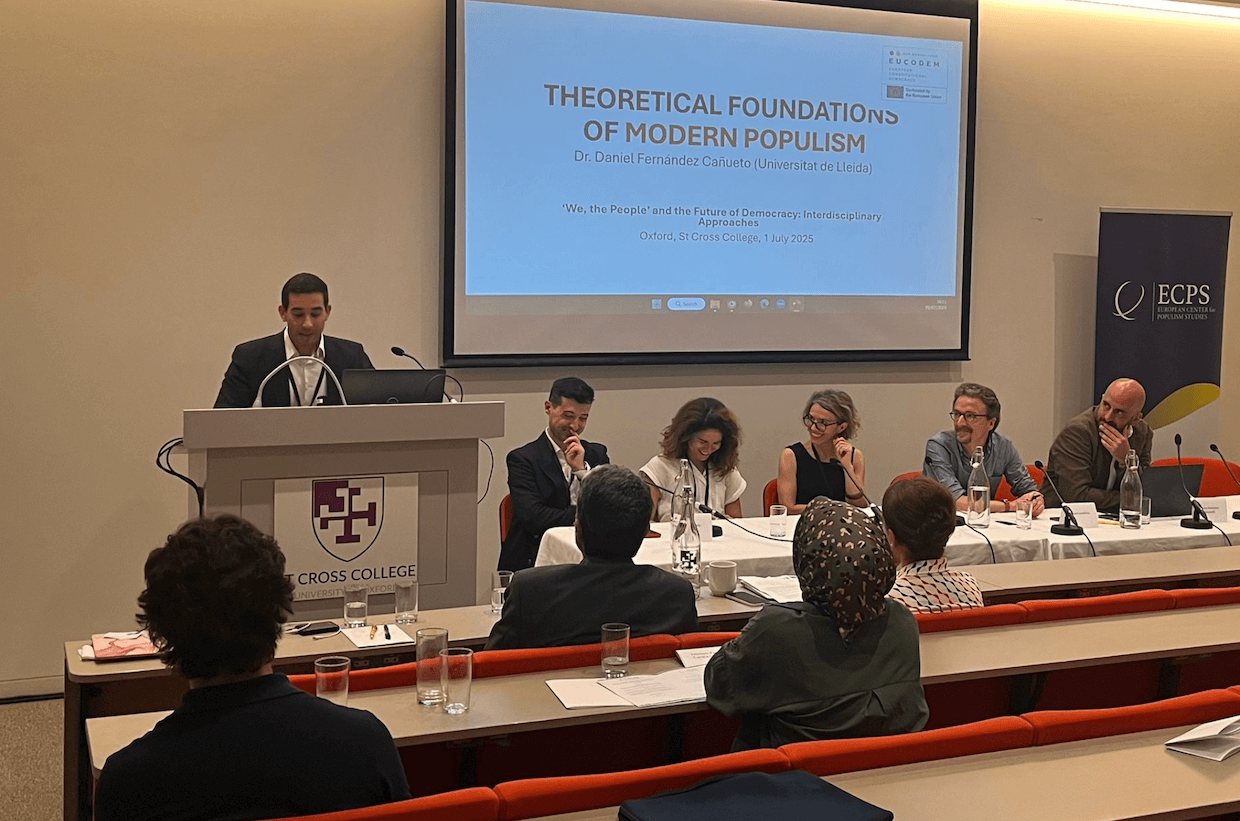
Delivered during Panel 3 of the ECPS Conference 2025 at Oxford University, Dr. Daniel Fernández’s presentation, titled “Theoretical Foundations of Modern Populism: Approaches of Heidegger, Lacan and Laclau,” offered a foundational philosophical and constitutional roadmap for understanding populism’s intellectual lineage and strategic application in contemporary democracies. As Assistant Professor of Constitutional Law at Universitat de Lleida, Dr. Fernández situated his intervention as a bridge—from philosophy to political theory to constitutional interpretation—providing the analytical groundwork for subsequent panelists.
The presentation began with a touch of humor and humility, yet what followed was an incisive and ambitious effort to condense a dense intellectual genealogy into a three-part inquiry: (1) What are the philosophical influences on Laclau and Mouffe’s theory of populism? (2) What is the core political question they pose and how do they answer it? (3) Is there a shared constitutional logic underlying populist strategies?
Addressing the first question, Dr. Fernández identified three major philosophical influences: Heidegger, Lacan, and Gramsci. Heidegger’s notion of Dasein—that human understanding is historically and socially embedded—informs Laclau and Mouffe’s rejection of political universals. For them, there is no fixed political subject, no final revolution, and no overarching ideology. Lacan’s theory of constitutive lack, which posits an unfillable void in human identity and language, is transferred by Laclau and Mouffe to the political domain: political identities are never fully complete but instead are formed and reformed through the discursive struggle over “empty signifiers.” Gramsci’s theory of hegemony and Heidegger’s view of politics as conflict converge in Laclau’s core argument that politics is a permanent agonistic struggle for meaning and power, waged through discourse rather than the discovery of objective reality.
Dr. Fernández emphasized that for Laclau and Mouffe, the essential political question—posed most clearly in Hegemony and Socialist Strategy—is how to gain and maintain political power within pluralistic democracies, given the impossibility of universal values or fixed identities. Their answer is populism—not as a regime or ideology, but as a political strategy. This strategy unfolds in three stages: first, constructing an adversary; second, framing this adversary not only as antagonistic but as “agonistic” (posing an existential threat to the group’s inclusion in the public sphere); and third, consolidating hegemony by mobilizing discourse across all spheres of life. Here, Dr. Fernández keenly noted the affective turn in populism: emotions, not rational deliberation, become the engine of mobilization.
The third part of the presentation dealt with constitutional theory. Dr. Fernández asked: Can populism be reconciled with constitutional democracy, or does it entail a fundamental reorientation of constitutional norms? Drawing a distinction between populism in opposition and in power, he observed that the strategy shifts: in opposition, populists seek to stretch and destabilize liberal-democratic institutions, maximize dissent, and bypass intermediaries like parties and media. Once in government, however, they move to restrict dissent, delegitimize checks and balances, and monopolize the exercise of popular sovereignty—while still maintaining the façade of electoral democracy.
Despite these strategic differences, Dr. Fernández identified a common constitutional logic across populist movements. First, populism redefines the people as a unified sovereign entity distinct from the plural citizenry. Sovereignty, under this vision, is not confined to the constituent moment but remains ever-present in the leader or the movement. Second, populists reject representation in favor of embodiment: leaders do not represent the people; they are the people. As such, they seek to dismantle parliamentary authority and concentrate power either directly in “the people” (in opposition) or in the executive (in power). Third, democracy becomes equated with decision, not deliberation. Consensus is abandoned, and constitutions are perceived not as foundational agreements but as constraints to be overcome.
In conclusion, Dr. Fernández offered three takeaways. First, Heidegger, Lacan, and Gramsci’s reconfigurations of self, language, and power deeply inform Laclau and Mouffe’s discursive populism. Second, populism was conceived as a strategy to win power in post-hegemonic, pluralistic societies. And third, while Laclau and Mouffe did not articulate a full constitutional theory, the implementation of their ideas has generated widespread constitutional tension—redefining sovereignty, eroding liberal safeguards, and foregrounding antagonistic leadership.
Dr. Fernández ended with a provocative question: Can democracy endure if political conflict becomes a permanent condition of public life? And more pressingly: Does the constant reproduction of political confrontation eventually create the very discontent that leads to undemocratic solutions? These questions, left deliberately open, invited both scholarly reflection and urgent political introspection.
Marco Antonio Simonelli: Erosion of the Independence of the Judiciary
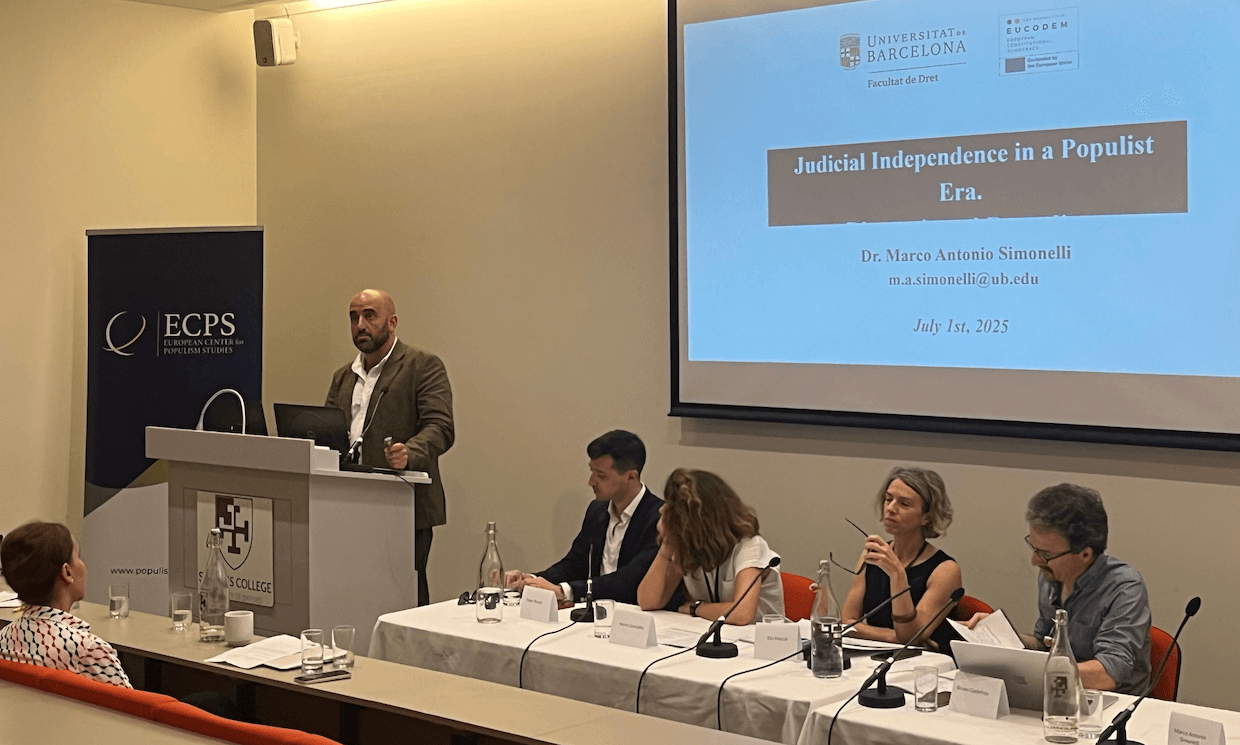
In his incisive and sobering presentation titled “Erosion of the Independence of the Judiciary,” Dr. Marco Antonio Simonelli—Assistant Professor of Constitutional Law at the University of Barcelona—offered a deeply legalistic yet politically resonant analysis of the ways judicial independence is being systematically undermined across contemporary constitutional democracies, especially under populist regimes. Taking the audience through a historically grounded, comparative, and multi-level assessment, Dr. Simonelli’s talk demonstrated how the erosion of judicial independence is not an isolated institutional anomaly but part of a broader authoritarian drift within democracies, often legitimized under the rhetoric of popular sovereignty.
Framed as a more strictly legal follow-up to preceding theoretical discussions, Dr. Simonelli’s argument proceeded in three carefully structured stages: first, a conceptual clarification of judicial independence and its role in constitutional democracy; second, an analysis of formal and informal attacks on judicial authority, particularly in populist regimes; and third, a review of possible legal and institutional remedies to protect the judiciary from political capture.
To begin, Dr. Simonelli returned to the roots of the idea of judicial independence in liberal constitutionalism. He invoked Montesquieu’s L’Esprit des Lois and the doctrine of the separation of powers to underscore that limiting government power requires not only legislative-executive separation, but a structurally insulated judiciary. While Montesquieu was cautious of judicial overreach—famously calling judges “the mouth of the law”—his model remained foundational in liberal democratic systems. By contrast, in the American tradition, Alexander Hamilton, writing in The Federalist Papers, viewed the judiciary as the “least dangerous” branch, possessing “neither the purse nor the sword.” Hence, Hamilton championed institutional safeguards such as life tenure and salary protection in Article III of the US Constitution to shield judges from political pressure.
Yet as Dr. Simonelli pointed out, while the US judiciary historically assumed a strong role in the separation of powers (e.g., Marbury v. Madison), in Europe the judiciary was more traditionally envisioned as the guardian of fundamental rights rather than an assertive counterbalance to the legislative and executive branches. Nevertheless, both models assume the indispensability of an independent judiciary for democratic governance.
Dr. Simonelli then provided a working definition of judicial independence, emphasizing structural guarantees like tenure security, impartial appointment processes, financial autonomy, and protection from executive interference. However, he noted that one crucial area of contention—particularly in comparative constitutional law—is the mode of judicial appointment. While European models tend toward merit-based career tracks, often with internal judicial oversight, the US and Latin American systems favor political appointments, raising questions about politicization and dependence.
From this doctrinal foundation, Dr. Simonelli pivoted to his core argument: that judicial independence is increasingly under threat, especially in populist contexts. He traced the roots of skepticism toward judicial power to North American legal scholarship in the 1980s and early 2000s, citing figures like Alexander Bickel and Ran Hirschl, the latter of whom warned against the emergence of juristocracy—a political regime ruled by unelected judges. Although these critiques were initially academic, Dr. Simonelli argued that they anticipated the current populist playbook, in which political leaders present judicial independence as an elitist obstacle to the “will of the people.”
The most visible and documented assaults on judicial independence, according to Dr. Simonelli, have occurred in Hungary and Poland. Beginning with Viktor Orbán’s rise to power in 2010–2011, Hungary launched a series of legislative reforms aimed at undermining judicial autonomy—lowering retirement ages, reshaping judicial councils, and centralizing disciplinary procedures under executive control. Poland followed a similar trajectory. Such formal attacks, Dr. Simonelli warned, are increasingly complemented by informal methods: rhetorical delegitimization, character assassinations of judges, and public discourse that portrays courts as politically motivated actors opposed to national interests.
Yet these dynamics are not limited to Eastern Europe. Citing recent statements from Elon Musk, Nigel Farage, and Donald Trump, Dr. Simonelli showed how even in consolidated democracies like the United States and the UK, public trust in the judiciary is being eroded by populist actors. The US Supreme Court’s declining legitimacy—only 30% of Americans now see it as independent, down from 40% in 2017—illustrates how hyper-politicized appointment processes and media-fueled polarization degrade the judiciary’s democratic function.
Dr. Simonelli emphasized that polarization—social as well as institutional—undermines judicial independence by blocking consensus on appointments and embedding judges within partisan frames. He illustrated this with the example of the Obama administration’s blocked judicial nominations, the Senate’s “nuclear option,” and the ensuing politicization of the Supreme Court. A similar impasse has stalled appointments in Spain, where the Council of the Judiciary has remained deadlocked for six years due to partisan gridlock.
Despite the bleak outlook, Dr. Simonelli concluded on a cautiously optimistic note, outlining a series of institutional remedies. These include (1) diversifying judicial appointment authorities to prevent single-party capture; (2) establishing anti-deadlock mechanisms, such as those adopted in Germany’s 2024 reform of its Constitutional Tribunal; and (3) enhancing judicial transparency, as demonstrated by Italy’s Constitutional Court, which has introduced public-facing programs and amicus curiae participation to build civic trust.
Finally, Dr. Simonelli underscored the importance of multi-level governance in defending judicial independence. The European Union, through the Commission and the Court of Justice, played a decisive role in resisting the collapse of judicial autonomy in Poland and, to a lesser extent, Hungary. He noted that events such as the 2025 Budapest Pride march—unthinkable without EU pressure—demonstrate the restraining influence of supranational frameworks.
In closing, Dr. Simonelli offered a pointed reminder: judicial independence is not a technocratic luxury, but the backbone of constitutional democracy. As populist movements challenge liberal norms under the banner of “the people,” defending the judiciary’s autonomy becomes not merely a legal imperative but a democratic one.
Núria González: Pro-Independence Movements as A Populist Way Out in Multinational Contemporary Societies
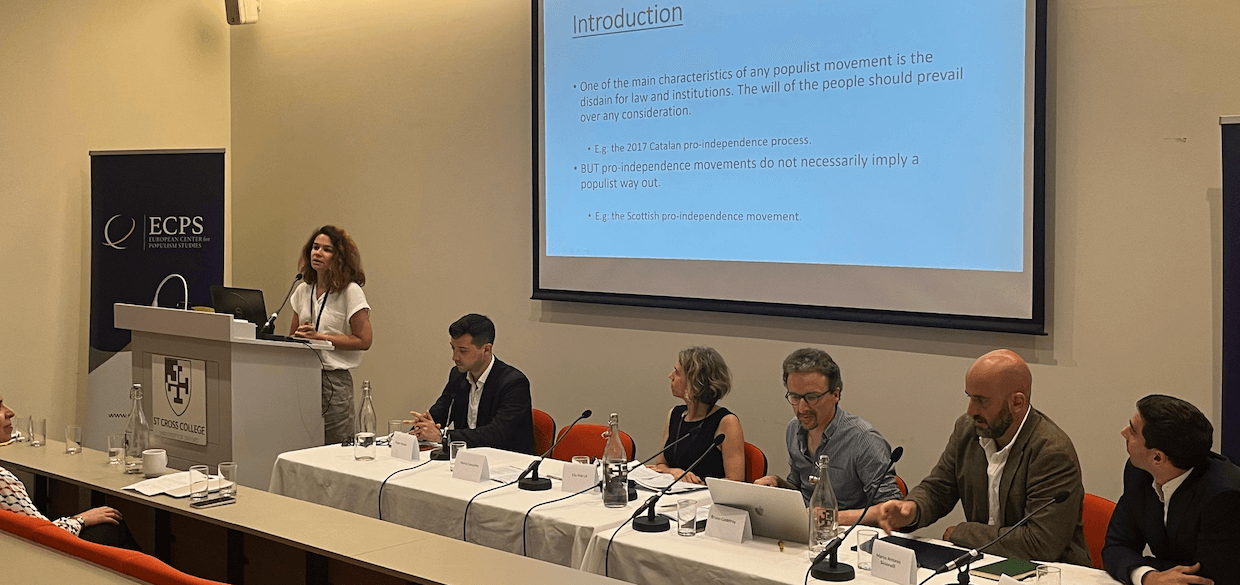
In her sharp and comparative presentation titled “Pro-Independence Movements as a Populist Way Out in Multinational Contemporary Societies” Dr. Núria González, Assistant Professor of Constitutional Law at the University of Barcelona, explored the constitutional dimensions and populist inflections of secessionist movements in liberal democracies. Using Catalonia (2017) and Scotland (2014–2022) as her principal cases, Dr. González drew a compelling contrast between two pro-independence movements operating under liberal democratic conditions but adopting strikingly different approaches to law, institutional legitimacy, and democratic procedure.
Dr. González positioned her contribution at the intersection of constitutional law and populism. She acknowledged the conceptual ambiguity surrounding the term “populism,” but emphasized that, for constitutional lawyers, populism is identifiable when political leaders directly challenge counter-majoritarian institutions—especially courts—and circumvent established legal procedures. This framing set the analytical tone: populism, she argued, is less about ideological content and more about a mode of political action that undermines institutional and legal restraints.
Her analysis focused first on the Catalan case. Beginning in 2012, Catalonia’s regional government, led by a coalition of pro-independence parties, pursued a referendum on secession from Spain. Their public discourse framed the initiative in emotionally resonant but legally simplistic terms—slogans like “voting is normal” and “this is about democracy” dominated the narrative. However, Dr. González underscored that referenda on secession are far from “normal” or common practice in constitutional democracies, citing examples where such votes have been banned or severely restricted (e.g., the United States, Germany, Italy, and Spain). While Canada and the UK permitted such referenda under specific political conditions, they remain legal exceptions, not norms.
Spain’s constitutional framework poses significant hurdles to unilateral secession. Article 1.2 of the Spanish Constitution declares that national sovereignty resides in the Spanish people as a whole, and Article 2 affirms the “indissoluble unity” of the Spanish nation. Furthermore, while the Spanish Constitutional Court recognizes the legitimacy of advocating for independence, it insists that such goals can only be pursued through formal constitutional amendments, which require supermajoritarian support—effectively an institutional safeguard to ensure broad consensus on foundational changes.
Despite these constraints and repeated rulings from both the Spanish Constitutional Court and the Catalan High Court, the Catalan Parliament in 2017 passed two laws aimed at authorizing a referendum and initiating the creation of a Catalan republic. These laws were approved by an absolute parliamentary majority—72 out of 135 seats—but Dr. González emphasized that this majority represented only 48% of the Catalan electorate. The laws not only violated the Spanish Constitution but also contravened Catalonia’s own Statute of Autonomy, which requires a two-thirds majority for amendments. In her view, this episode revealed a populist strategy: a deliberate bypassing of legal constraints and institutional warnings in favor of majoritarian, identity-driven mobilization.
The Catalan leadership’s decision to proceed with the October 2017 referendum—despite judicial prohibitions—constituted, in Dr. González’s interpretation, a textbook example of populist defiance of counter-majoritarian institutions. She stressed that this confrontational approach exacerbated societal polarization in Catalonia, leaving deep political and social wounds that persist today.
In contrast, Dr. González turned to the Scottish case, which she presented as an example of institutional fidelity within a liberal democratic framework. The 2014 Scottish referendum on independence was legally permitted, politically negotiated, and constitutionally authorized. The UK’s constitutional flexibility—grounded in parliamentary sovereignty and an uncodified constitutional order—enabled the central government to temporarily amend the Scotland Act of 1998, thereby granting the Scottish government the authority to organize the referendum.
What is remarkable, Dr. González argued, is the political and institutional maturity with which the UK handled the question of secession. Even political actors historically opposed to devolution, like Margaret Thatcher, publicly acknowledged Scotland’s right to self-determination. The referendum was made possible not through legal defiance but through democratic consensus and negotiated legal channels.
She then addressed the more recent episode in 2022, when First Minister Nicola Sturgeon sought to organize a second referendum following Brexit. Sturgeon proposed a non-binding, consultative referendum, hoping to remain within Scotland’s devolved competencies. However, rather than proceeding unilaterally, the Scottish Government submitted the bill to the UK Supreme Court for pre-emptive judicial review. The Court ruled that even an advisory referendum on secession would have significant political and legal consequences, and thus exceeded the Scottish Parliament’s competencies. The Scottish response, Dr. González emphasized, was telling: rather than defy the Court, Sturgeon publicly accepted the ruling and sought alternative democratic strategies—such as treating future elections as de facto referenda.
This difference in legal and political comportment forms the crux of Dr. González’s argument. She concluded that the Scottish case illustrates a constitutionalist approach to secession—one that respects institutional boundaries, legal clarity, and the rule of law—while the Catalan case demonstrates a populist pattern: the instrumentalization of democratic language to circumvent constitutional norms and foster antagonistic “us vs. them” dynamics.
Her final reflection was pointed and poignant: one of the reasons Catalonia remains more polarized and socially fractured than Scotland, she argued, lies in the different paths their leaders chose. Where Scottish leaders pursued independence through institutional loyalty and negotiated democracy, Catalan leaders opted for a populist route that prioritized emotional mobilization over constitutional legality.
In sum, Dr. González’s comparative inquiry provided not just a legal diagnosis but also a normative caution: in multinational democracies, how secessionist claims are pursued matters as much as the claims themselves. Populism, in this context, is not defined by aspirations to independence, but by the willingness to defy the constitutional framework that makes democracy possible.
Elia Marzal: The Role of Parliaments in Secession Referenda — Canadian Doctrine and Consensus Democracy in Decision-Making Processes
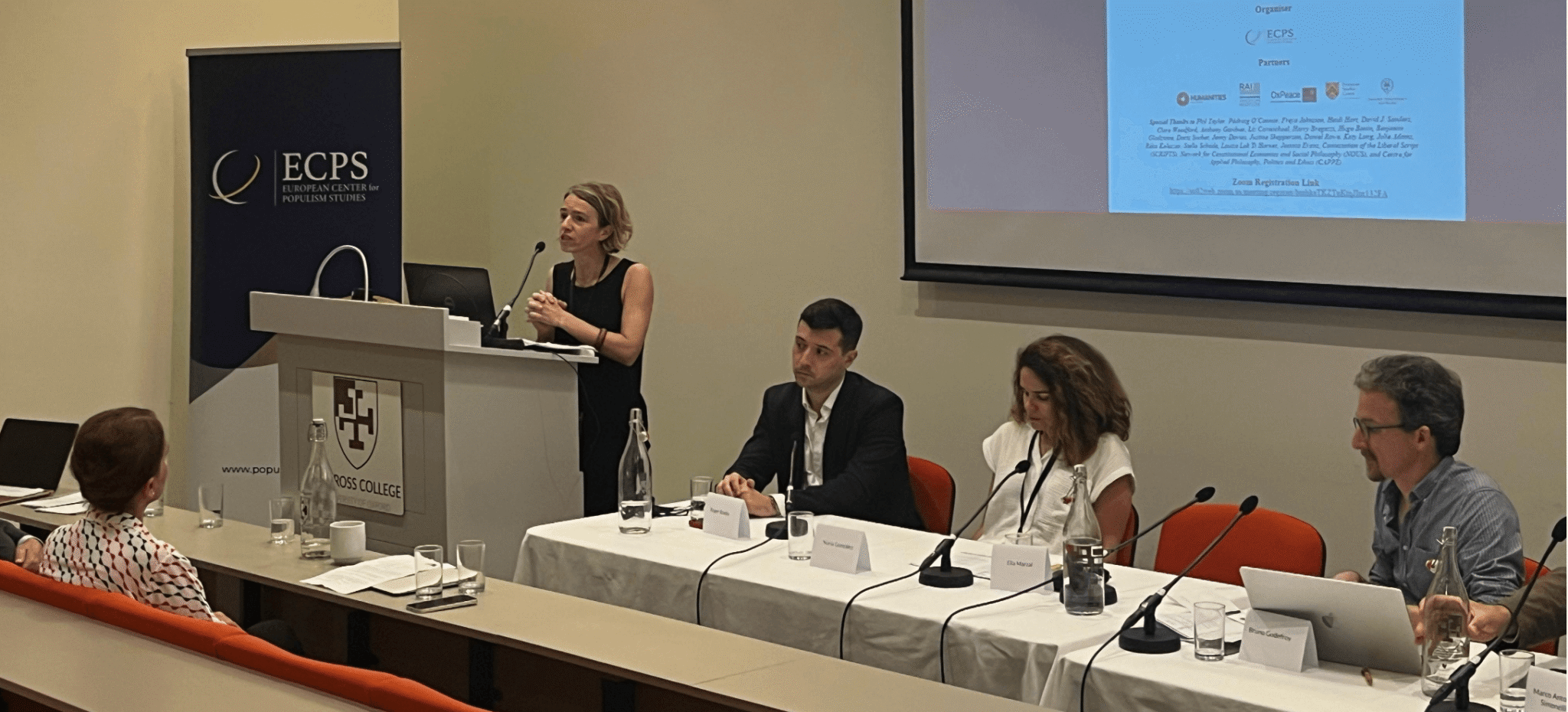
In her presentation, Dr. Elia Marzal, Associate Professor of Constitutional Law at the University of Barcelona, offered a jurisprudentially grounded and theoretically expansive reconsideration of how liberal democracies should approach secessionist claims. Focusing on the Canadian experience, Dr. Marzal argued that parliamentary institutions—not referenda—ought to be central in mediating territorial disputes in heterogeneous states. Far from endorsing referenda as inherently democratic instruments, she challenged their assumed neutrality and democratic legitimacy in contexts marked by pluralism and constitutional complexity.
Drawing on the landmark 1998 opinion of the Supreme Court of Canada and the subsequent Clarity Act (2000), Dr. Marzal demonstrated that Canada’s constitutional response to the Quebec question has been widely misunderstood. While often cited by secessionist movements as a liberal precedent that affirms the legitimacy of independence referenda, a closer reading of the Court’s reasoning reveals a more nuanced reality. Dr. Marzal emphasized that the Canadian framework is not referendum-centered but rather designed around parliamentary mediation, institutional pluralism, and procedural complexity.
At the core of the 1998 ruling, Dr. Marzal observed, lies an effort to reconcile the tension between legality and legitimacy: the former grounded in constitutional norms and the latter in democratic aspirations for self-determination. The Court did not resolve this tension through a simple endorsement of popular vote; instead, it laid out a multilayered process of negotiation involving federal and provincial institutions, subnational governments, and other relevant actors, including indigenous communities. In this model, Parliament assumes a pivotal role, functioning both as arbiter and guarantor of institutional legitimacy.
This centrality of Parliament was later codified in the Clarity Act, which grants the Canadian federal Parliament the authority to determine whether a referendum question is clear and whether the resulting majority is sufficient to warrant negotiations. Dr. Marzal interpreted this not as a marginal procedural safeguard but as a fundamental assertion of parliamentary sovereignty in a context where democratic legitimacy must be constructed—not assumed.
To underscore the continuing relevance and challenges of this model, Dr. Marzal examined more recent developments in Canadian federalism, including Alberta’s Sovereignty Act (2022) and ongoing debates in Quebec about adopting mechanisms to shield the province from federal interference. While these provincial initiatives invoke the rhetoric of autonomy, she warned that they risk distorting the spirit of the Canadian legal framework by deploying legal tools in service of unilateralism rather than institutional dialogue.
Dr. Marzal then turned to the United Kingdom’s 2022 Supreme Court opinion concerning the Scottish Government’s push for a second independence referendum. Much like in Canada, the UK Court affirmed that constitutional change must proceed through legislative authorization—reaffirming Parliament’s role as the central forum for constitutional adjudication. In both jurisdictions, she noted, courts have recognized that the legitimacy of secessionist claims cannot be divorced from institutional frameworks designed to represent the full diversity of the polity.
The theoretical foundation of Dr. Marzal’s analysis draws from social choice theory and public choice theory. Social choice theory, she explained, underscores the inherent limitations of aggregating individual preferences through majoritarian mechanisms such as referenda. Public choice theory, by contrast, highlights the difficulties of reaching legitimate outcomes in contexts of high polarization and affirms the need for decision-making processes that secure genuine consent.
In Dr. Marzal’s interpretation, the Canadian Supreme Court’s 1998 opinion was not merely a judicial ruling but a constitutional design effort—an attempt to construct a deliberative, consensus-oriented model of democratic legitimacy. This model resists the populist impulse to collapse complexity into binary choices and instead affirms that legitimacy arises from the interaction of diverse institutions, procedures, and actors within a pluralist constitutional order.
Two key conclusions emerged from her analysis. First, the legitimacy of decisions concerning secession is directly proportional to the complexity and inclusivity of the procedures used to reach them. The more divisive the issue, the more robust and multilateral the process must be. Second, Dr. Marzal stressed that in such high-stakes contexts, democracy cannot be reduced to the will of a singular “people.” Rather, it must be reimagined as a process of consensus-building through representative, pluralistic, and deliberative institutions—chief among them, Parliament.
In closing, Dr. Marzal called for a reorientation of secession debates away from populist and plebiscitary framings and toward the rich, if demanding, tradition of consensus democracy. By restoring parliamentary centrality and institutional dialogue to the heart of democratic decision-making, she argued, states can respond to secessionist claims in a manner that is both constitutionally sound and democratically legitimate.
Roger Boada: Potential Solutions: Second Chambers, Demos and Majoritarian Body
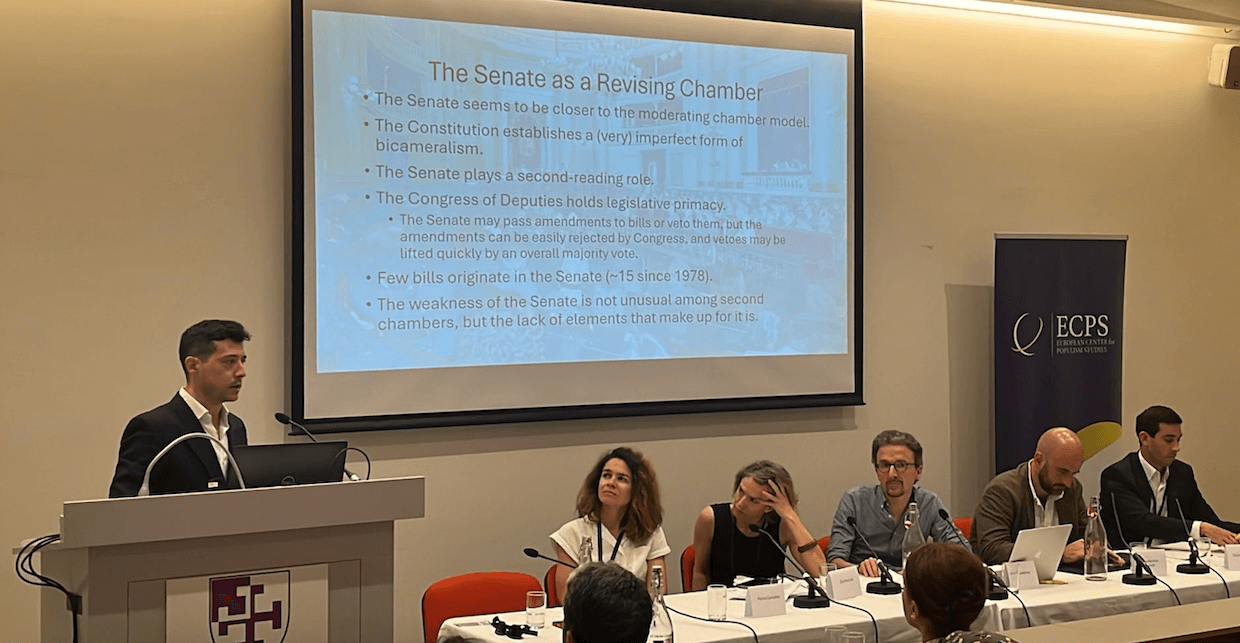
In his presentation titled “Potential Solutions: Second Chambers, Demos and Majoritarian Body,” Dr. Roger Boada, Assistant Professor of Constitutional Law at the University of Barcelona, examined the theoretical and institutional potential of second chambers in contemporary constitutional democracies. While the title suggested a broad comparative analysis, Dr. Boada offered a focused and critical assessment of the Spanish Senate, using it as a case study to reflect on wider questions of democratic representation, constitutional design, and the institutional containment of populism.
Dr. Boada began by situating bicameralism within a broader normative framework. He noted that the traditional rationale behind second chambers is rooted in an anti-populist impulse: the belief that the demos cannot be adequately represented by a single, majoritarian legislative body. A second chamber, in this context, is meant to reflect social and territorial pluralism, provide a space for sober second thought, and moderate legislative impulses driven by fleeting popular majorities. In federal or quasi-federal systems, this usually manifests as a "territorial chamber" intended to provide representation for constituent units such as states or regions.
Dr. Boada traced the constitutional debates in Spain during the transition to democracy in the late 1970s, where two competing visions for the Senate were considered. The first envisioned the Senate as a territorial chamber, echoing the model of the US Senate or the German Bundesrat, where subnational units are given a participatory role in national decision-making. The second envisioned it as a moderating or revising chamber, inspired more by the British House of Lords, with a focus on reflection and legislative oversight. Ultimately, Dr. Boada argued, the Spanish Constitution opted for the latter, despite Article 69.1’s declaration that the Senate is the "Chamber of territorial representation."
To support this claim, Dr. Boada examined both the powers and composition of the Senate. Functionally, the Spanish Senate has few competencies that would distinguish it from the lower chamber (the Congress of Deputies) in territorial matters. It plays no unique role in approving or amending the statutes of autonomy—the foundational legal texts of Spain’s autonomous communities. Nor does it serve as a regular venue for intergovernmental dialogue or conflict mediation between the central government and the regions. The sole exception is Article 155 of the Constitution, which allows the Senate to authorize coercive measures against an autonomous community in cases of serious constitutional violation—a power used only once, during the Catalan crisis of 2017.
Dr. Boada then turned to the composition of the Senate, which further undermines its claim to territorial representativeness. The majority of senators are elected on a provincial basis, but provinces in Spain have no political autonomy; only the autonomous communities do. Moreover, only around 20% of senators are appointed by regional parliaments, and even these appointees tend to act along national party lines rather than representing regional interests per se. In practice, Dr. Boada noted, senators—whether elected or appointed—do not behave in ways that distinguish them as representatives of territorial constituencies. The dominance of political parties within the Senate further undermines any distinctive regional function.
Given these institutional realities, Dr. Boada concluded that the Spanish Senate functions far more like a revising or moderating chamber than a federal or territorial one. However, even in this role, its influence is limited. The Senate can veto legislation or propose amendments, but both actions can be easily overridden by the Congress of Deputies. Its legislative productivity is marginal: only 15 bills originating in the Senate have become law since 1978. Nor does it carry the auctoritas that characterizes second chambers in some other parliamentary systems, such as the British House of Lords.
Dr. Boada observed a curious paradox in recent Spanish politics. Since 2023, the Senate has been under the control of the opposition party (the centre-right Partido Popular), while the Congress remains governed by a fragile left-leaning majority. This political asymmetry has led the Senate to assume a more assertive, oppositional role—issuing legislative vetoes, initiating constitutional conflicts, and acting as a de facto counterweight to the executive. However, this newfound assertiveness has not been met with institutional reinforcement. On the contrary, Dr. Boada showed that the governing majority in Congress has responded by curtailing some of the Senate’s powers—for instance, altering budgetary procedures and reducing its influence in public media governance.
This dynamic, Dr. Boada warned, reflects a structural vulnerability: when second chambers become politically inconvenient, their limited powers may be further weakened rather than reimagined or bolstered. The Senate’s increased activity has not translated into increased legitimacy or capacity, but rather into institutional backlash.
In concluding, Dr. Boada offered two critical reflections. First, the Spanish Senate does not currently fulfill the functions traditionally ascribed to second chambers—neither as a robust territorial forum nor as a meaningful legislative check. Second, any serious conversation about the role of second chambers in pluralist democracies must grapple with political realities: without constitutional guarantees of autonomy, representativeness, or procedural weight, second chambers risk becoming either symbolic appendages or targets of majoritarian retrenchment.
In sum, Boada’s presentation used the Spanish Senate as a lens through which to explore the broader question of how institutional design can (or cannot) accommodate pluralism, resist populist simplification, and enhance democratic resilience. His analysis called for a reassessment of second chambers not merely as institutional relics, but as potentially vital—if currently underdeveloped—sites for democratic negotiation in divided societies.
Conclusion
Panel III of the ECPS Conference 2025 delivered a rich, interdisciplinary examination of the constitutional vulnerabilities exposed by the rise of populism and proposed forward-looking strategies for democratic resilience. Across five presentations, the panelists offered a powerful synthesis of theory, case law, and comparative analysis, moving beyond abstract critiques to address the institutional mechanics of populist encroachment and possible legal remedies.
Several core insights emerged. First, Dr. Daniel Fernández’s philosophical excavation of populism underscored its strategic use of antagonism, identity construction, and constitutional disruption. Far from being ideologically neutral, populism reconfigures the meaning of democracy—reducing it to majoritarian assertion and executive embodiment. Second, Dr. Marco Antonio Simonelli highlighted the structural erosion of judicial independence, not only in Eastern Europe but across established democracies, where populist leaders increasingly frame courts as elite obstacles to the popular will. His analysis of institutional safeguards and multi-level governance revealed both the fragility and critical importance of judicial autonomy.
Third, Dr. Núria González’s comparative study of Catalonia and Scotland illuminated the profound difference in democratic outcomes when secessionist claims are pursued through populist defiance versus constitutional fidelity. Complementing this, Dr. Elia Marzal’s intervention re-centered the role of parliaments in secession debates, urging a shift from plebiscitary to deliberative models of democracy rooted in institutional pluralism. Finally, Dr. Roger Boada’s critique of the Spanish Senate exposed the risks of symbolic institutionalism in the face of populist pressure and underscored the need to reinvigorate second chambers as meaningful forums for territorial representation and legislative restraint.
Together, the panelists made clear that constitutional democracies must adapt not by mimicking populist rhetoric, but by renewing institutional frameworks that enable inclusion, negotiation, and complexity. In an age of polarization, democratic endurance depends not just on resisting populism—but on designing systems capable of absorbing and transforming it.
Note: To experience the panel’s dynamic and thought-provoking Q&A session, we encourage you to watch the full video recording above.

